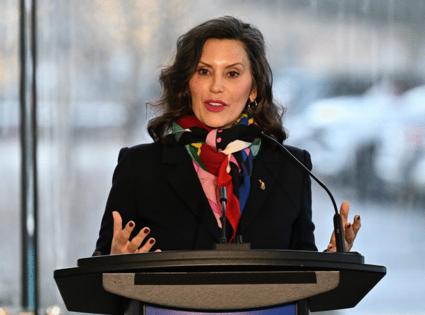Michigan government shutdown concerns rise as GOP House speaker pivots on tax cut plan
Published in News & Features
LANSING, Mich. — Michigan Senate Majority Leader Winnie Brinks, D-Grand Rapids, said Wednesday that she's concerned about a potential state government shutdown this fall and that it's irresponsible to delay budget negotiations in the Capitol any longer.
Brinks made the comments during a press conference 48 days before the end of the state's fiscal year, as the Democratic-controlled Senate and Republican-led House struggle to reach a compromise on the annual funding plan.
The Senate approved an $84.6 billion budget proposal in May, but the House hasn't introduced a full plan yet.
"Given the track record that we've seen from House Republicans, I am concerned," Brinks said of a potential shutdown. "We should have been doing all of this together as a Legislature months ago.
"It's not that it's impossible to get it done, but the clock is ticking. And there is a sense of urgency around it."
House Speaker Matt Hall, R-Richland Township, held his own press conference later Wednesday.
Hall has prioritized finding $3 billion in current revenues to shift to road projects and cutting the state income tax from 4.25% to 4.05%. He's criticized Senate Democrats for not coming up with their own ideas to boost funding for road and bridge work, which has long been a focus of Democratic Gov. Gretchen Whitmer.
The speaker said he was confident that Whitmer will get Democrats "in line" and a budget would get passed before the Sept. 30 deadline.
“This is all about politics for the Democrats," Hall said.
But Hall also pivoted on Wednesday on his prior commitment to cut the state income tax, instead advocating for "magnifying" the cuts to taxes on Social Security, overtime and tips in the federal One Big Beautiful Act President Donald Trump signed into law last month.
An across-the-board income tax cut would have eliminated about $700 million in revenue, whereas slashing taxes on Social Security income, overtime pay and tips would leave the state's coffers with $150 million less revenue, Hall said.
"What I've decided to do is to prioritize, amplify tax cuts in the One Big Beautiful Bill and, for that reason, I'm not recommending (in) our budget that we put the full income tax repeal," Hall said.
Whatever budget plan eventually becomes law will have to gain the OK of Brinks, Hall and Whitmer. However, Brinks said on Wednesday she and Hall have not had a one-on-one conversation in longer than a month. It's possible that the two leaders haven't spoken to each other at all in that same period of time, Brinks said.
There have been conversations happening among staff members, Brinks said.
"We keep initiating contact so that we can keep this going," Brinks added.
Hall, when asked on Wednesday whether he could confirm the two leaders hadn't talked in a month, said he didn't want to contradict her statement.
"I'll just say that I talk to her more than people think," Hall said.
The Michigan Constitution requires a balanced budget to be in place by Oct. 1. Without one, a shutdown could interrupt state services, keep state workers off their jobs and possibly delay payments to schools.
The government has not shut down since 2009, when Democratic then-Gov. Jennifer Granholm and Republican then-Senate Majority Leader Mike Bishop missed the deadline by several hours.
In late August 2019, amid worries about a potential shutdown that year, then-State Budget Director Chris Kolb asked state department directors to identify critical functions within their departments that must continue and those that could be temporarily halted if there was no budget in place by Oct. 1, 2019, the first year of Whitmer's first term as governor.
Kolb’s 2019 message also asked directors to list the number of their employees who would be sent home versus those who perform “essential functions” and should stay on the job in a complete or reduced capacity.
On Monday, Whitmer told reporters that she remained "optimistic" and "committed" to getting the budget done on time.
"We are not even close to the deadline yet," Whitmer said. "We're closer than I'd like to be already, but there's a lot of time left."
However, Sen. Jeff Irwin, D-Ann Arbor, said damage from inaction on the budget has already been happening as schools prepare for students to return in the coming days. Schools have had to make more conservative decisions about hiring educators because they don't know how much money they'll have, Irwin said.
"Let's get this work done," Irwin said. "Our schools deserve better. Our communities deserve better. Our kids deserve better."
_____
©2025 The Detroit News. Visit detroitnews.com. Distributed by Tribune Content Agency, LLC.







Comments